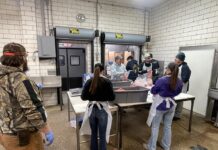OTTAWA – Canadian officials confirmed Sunday, Jan. 2, that a 9-year-old dairy cow from Alberta, Canada, tested positive for bovine spongiform encephalopathy (BSE).
The infected animal was born in 1996, prior to the introduction of the 1997 feed ban. According to the Canadian Food Inspection Agency, it is suspected the animal became infected by contaminated feed before the ban.
No part of the animal entered the human food or animal feed systems, the agency said in a statement Jan. 2.
The infected animal was detected through the national surveillance program and identified as a downer, which is one of the high-risk categories targeted by the program.
The inspection agency located the cow’s farm of origin and is now investigating recently born offspring of the infected animal and other cattle born on the farm in 1996.
Border still opens. U.S. officials announced the move to open the border to Canadian live feeder calves under 30 months of age will continue.
“In the extensive risk analysis conducted as part of the rule making, we considered the possibility of additional cases of BSE in Canada,” said Ron DeHaven, USDA’s Animal and Plant Health Inspection Service administrator.
“Because of the mitigation measures that Canada has in place, we continue to believe the risk is minimal.”
DeHaven said APHIS officials are working closely with Canadian officials as they conduct the current investigation.
More to come? Canadian officials say more BSE cases may be found as testing of high-risk cattle continues.
Get 4 Weeks of Farm and Dairy Home Delivered









